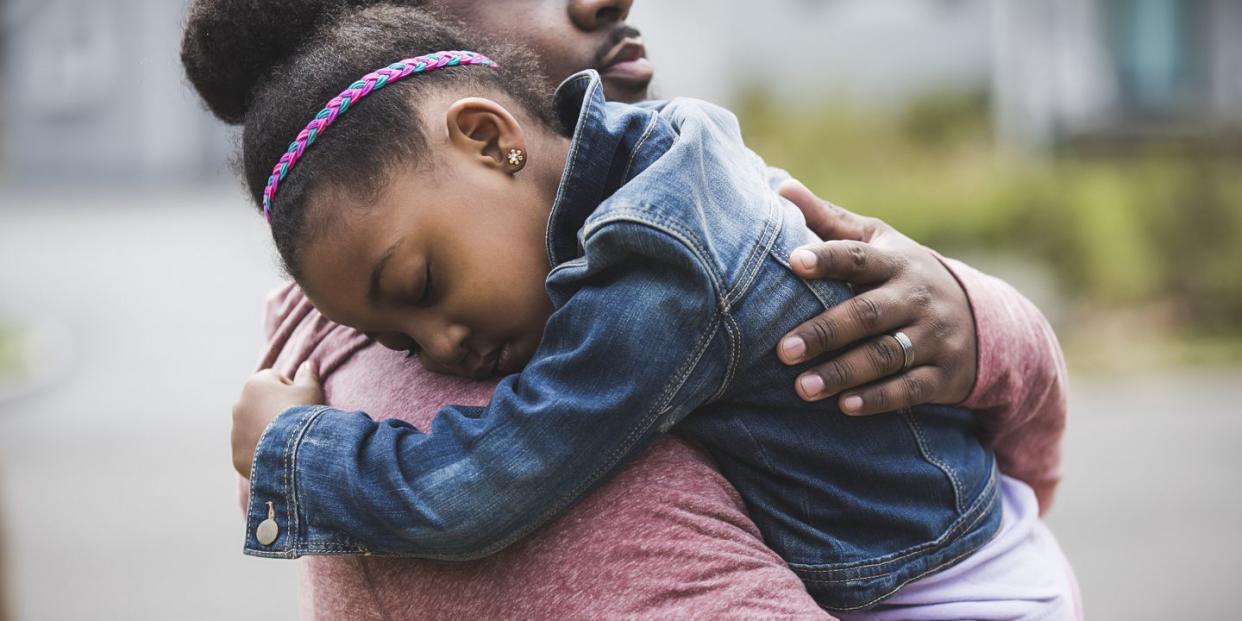Psychiatrists Break Down What to Do When Your Child Asks About School Shootings

"Hearst Magazines and Yahoo may earn commission or revenue on some items through the links below."
Sadly, there isn't a shortage of tragic news or devastating public events being broadcast on national programs or dissected on social media. When a tragedy strikes — catastrophic natural disasters, international discord and war, a heartbreaking mass shooting or life-changing terrorist events — it's often hard enough to sort through this news yourself, let alone help your family make sense of it. No wonder Americans are riddled with stress and anxiety, as well as depression, in the long run.
As a parent, you may feel compelled to shield your child from learning about traumatic events. Unfortunately, there's a really good chance your child will hear about it anyway, even just in passing. Taking the opportunity to jump in front of this exposure is the most effective way to reduce emotional blowback, experts agree.
Plus, trying to keep them out of the loop may do more harm than good. “If your child has not heard about the latest publicized images of tragedy, it could be helpful to bring it up in your household because this gives you the opportunity to control the narrative,” says Tyish Hall Brown, Ph.D., M.H.S, associate professor of psychiatry specializing in Adolescent Psychology at Howard University College of Medicine and author of Navigating Teen Mental Health.
She explains that hesitating to start these types of discussions with your child may end up exposing them to false narratives, which can create anxiety. “They may have a difficult time processing the news on their own — and this could lead to other problems,” continues Hall Brown. “So do not hide the news, but instead follow their lead with questions or feelings that may come up.”
Lea Lis, M.D., child psychiatrist, an assistant clinical professor at New York Medical College and author of the guidebook No Shame: Real Talk With Your Kids, adds that letting children slip into what's known as ostrich syndrome (the act of avoiding unpleasant information) will not help them adjust in society. “We are trying to make children global citizens, so we are responsible for making them understand that the world can be a sad and complicated place, along with giving them the tools to navigate it," she says.
But how does one help such a young mind navigate a terrifying reality? And what about mitigating your own fears and concerns first, before addressing the urge to help your child? With the help of these specialized youth psychiatric professionals, we're sharing strategies to help guide difficult conversations — as well as special tips for children ages 4 through 8 who may find direct conversation too overwhelming.
Talking to children of all ages about tragedy:
Validate their feelings first.
“Emotional validation is the key to parenting and always a great place to start,” explains Dr. Lis. For example, saying, “I understand that you are sad, angry, scared, or confused right now” allows your child to feel heard and understood.
Hall Brown expresses that letting your child know their emotions are “normal” can be the first step in easing their worries. “Some parents may acknowledge that they are feeling a little uncomfortable or anxious, as well, and all of these reactions are okay.”
In fact, Dr. Lis didn’t hide her tears from her 9-year-old daughter on the morning after the elementary school shooting in Uvalde, Texas. “Letting her see me cry is important since it teaches appropriate expression of emotion when things are sad.”
Follow their lead in discussion.
It's natural to make assumptions as to how your child may be feeling or what they may be thinking regarding a particular dreadful event — but open your conversation with a statement that gives them a moment to reveal themselves.
Hall Brown shares that shortly after news breaks about a terrible public loss, she and her 10-year-old watched a news report together, which was followed by Hall Brown asking about her daughter’s initial thoughts. “Because parents don’t have a 'Magic 8' ball, we can’t really know for certain what is worrying our child,” she explains. “While we know where our personal worries are at in the moment; our kids could be worried about something completely different.”
Furthermore, if you introduce an upsetting hypothetical situation to your child that they hadn’t even considered, this could create unnecessary anxiety. “Let them lead us down a path of their worries so we can address their specific concerns.”
Be honest — yet brief.
Dr. Lis advises speaking to your child about a tragedy using developmentally appropriate language. “The younger the child, the fewer details you need upfront.” For example, she said the following to her daughter about the latest school shooting: “Someone who was very angry couldn’t control their emotions, did not get the help they needed, and shot innocent people.” However, Dr. Lis purposely omitted that some of the victims were the same age as her daughter.
It’s also important to point out reasons why your child is safe. For example, Hall Brown suggests saying to your child, “This person is no longer a danger,” in the event that a gunman in a publicized news story has been caught or killed.
“Reiterate the positives in the world,” she continues. “Explain to your child there are many more good people than bad people in society.”
Dr. Lis also suggests using this opportunity to impart your family values on the topic at hand (i.e. gun control, protesting in public). “It’s okay to share your personal message.”
Quell anxiety with on-the-spot exercises.
If you notice that your child is feeling nervous, both Drs. Lis and Hall Brown offer mindfulness techniques that can quickly instill calmness. “I have tried to get kids under the age of 12 to meditate, but many do not have the focus and concentration,” adds Dr. Lis.
Instead, try some breathing practices. Dr. Lis instructs her young patients to take in a deep breath for four seconds, hold it in for four seconds, release it slowly over four seconds — then repeat. “It’s like giving them a timeout to catch their breath," she adds.
Dr. Hall Brown turns to a “game” that highlights the five senses: Ask your child to take a moment and name five things they see, four things they hear, three things they can touch, two things they smell and one thing they taste. “The order of the senses does not matter—the object is to focus on what is around them in the present moment so it stops their mind from spiraling.”
Encourage your child to journal.
“A ‘worry journal’ can give your child a place to write down their worries in order to get it out of their system,” states Dr. Hall Brown. She explains that anxiety develops as negative thoughts continue to swirl around in the mind. “As these thoughts spiral, they magnify and can eventually turn into something that is difficult to manage. Writing in a ‘worry journal’ before bedtime, in particular, can be a great way to help reduce anxiety.”
Turn fear into empowerment.
Taking proactive actions, such as practicing a family safety plan, learning to be more vigilant or volunteering for a related cause, can provide a positive outlet for stress and sadness. “Younger kids can run a lemonade stand and send the money to a charity, such as a family who has been affected by a tragedy,” says Dr. Lis.
She also strongly encourages writing a letter to your senator and/or member of Congress with your child. “Even if the elected officials don’t change things, the act of writing can be very healing — and doing so with your children is a great way to get them started in advocating for change.”
Limit exposure to media.
There’s a difference between being informed and being inundated. Between the 24/7 news cycle — along with the anytime, anywhere access to social media — watching the world’s events on a loop can be daunting. “Looking at sensational, gruesome images over and over can have a deleterious effect on children,” states Dr. Lis. “You have a responsibility as a parent to monitor what they are seeing.”
Dr. Hall Brown reminds parents to examine their own habits, as well. “We know that kids are sponges and they are hearing the news you have on in the home.” In fact, she limits herself to a half-hour of news in the morning and a quick follow-up in the evening. “I try not to spend all day long listening to the news because it is hard to hear.”

Talking to more sensitive children, ages 4 through 8
Let their creativity do the talking.
Children tend to have a gift for expressing themselves through art and play. Hall Brown recommends asking your child to draw a picture of whatever is on their mind. “It’s usually easier for them to explain something they have drawn.”
Dr. Lis will encourage her young patients to play with a family of dolls during a counseling session in order to help the child release their feelings. The benefits of dolls in clinical therapy have been highlighted in research that spotlights it's ability to encourage "play and expression," among other benefits.
Rely on emojis.
Since younger kids lack the language skills to clearly communicate their feelings, ask them to point to the emoji that best represents their emotions. “Whether it’s the crying emoji, sad emoji, frightened emoji, confused emoji, the parent will have a better understanding of their child,” says Hall Brown. “They may simply need quiet, quality time with mom and dad.”
Calm breathing with a friendly fish.
Practice slow and steady breathing with the help of a popular puffer fish, suggests Hall Brown. “Kids follow along as the fish expands and releases air. It’s very easy to access, is only about one-minute long and is engaging enough for young children to catch on. It does not need to be used for only intense moments—it’s useful to practice throughout the day. I wish I had developed it myself!”
When to seek additional help:
If your child is exhibiting signs of problematic behavior — including the inability to function, a fear of going to school, disinterest in doing after-school activities, a drop in grades, a change in appetite or sleep pattern — both Drs. Lis and Hall Brown stress the importance of seeking professional help.
“There are moments when a child’s emotions are more than what a family can handle, and it’s important to know that it’s okay to get a mental health evaluation,” concludes Hall Brown.
For more resources and help in confronting traumatic news with your child, visit the American Academy of Pediatrics and think about tapping into your child's school district resources. If you or your child, or someone you know, is in an emergency, call The National Suicide Prevention Lifeline at 1-800-273-TALK (8255) or call 911 immediately.
You Might Also Like

